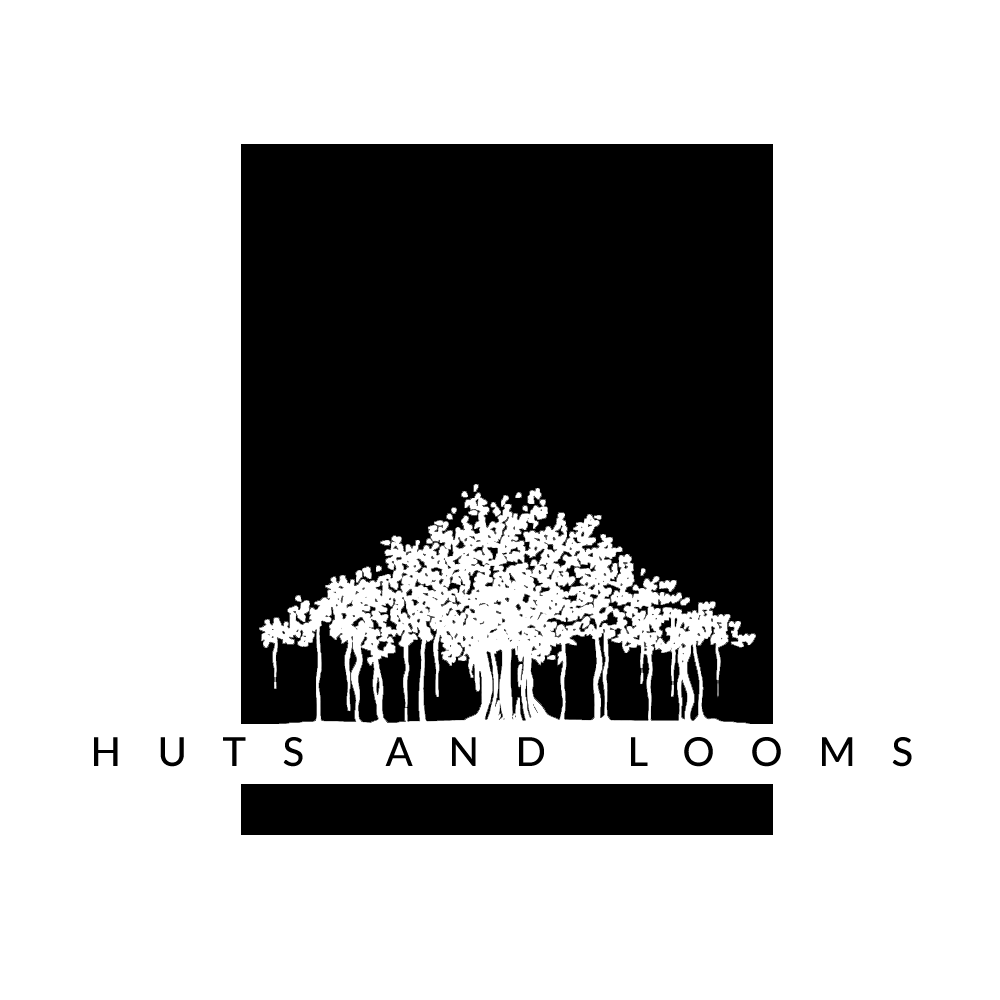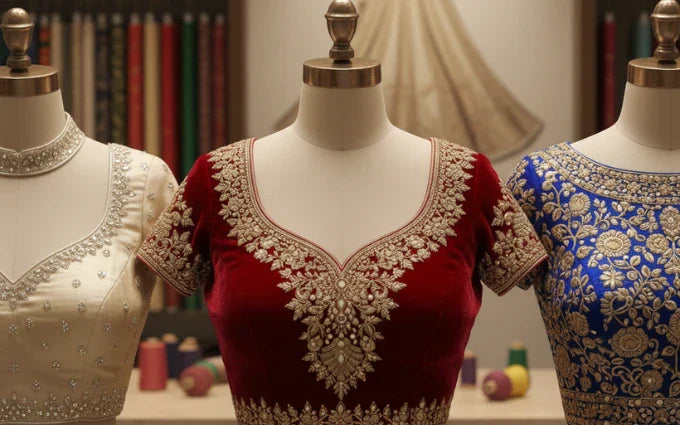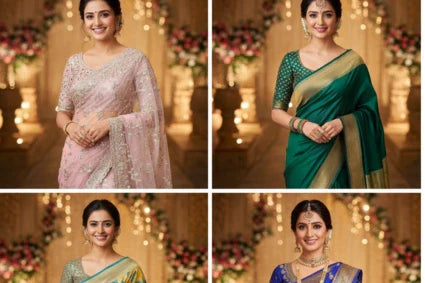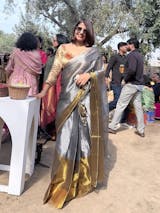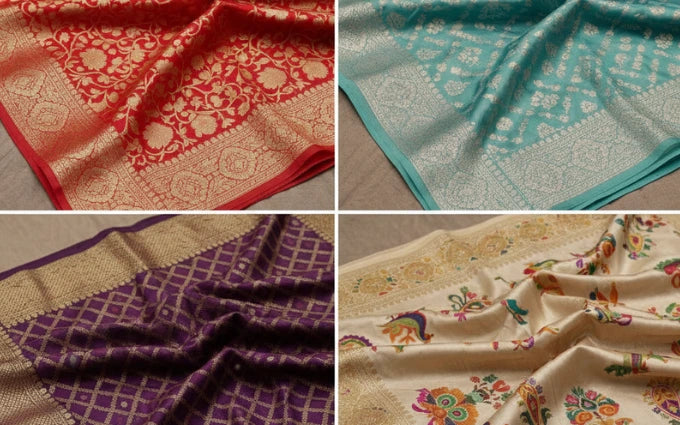
5 Types of Banarasi Sarees and What Makes Each One Unique
The Banarasi saree has a rich history attributed to it in a very few pieces of textile in the world. These sarees are not just a memory of centuries of craftsmanship, but they were produced in the spiritual centre of India, Varanasi. Banarasi sarees were traditionally woven using pure silk using actual zari; thus, they were considered royal. They are today one of the most revered works of Indian heritage, which symbolised grace, art and eternal beauty.
Every weave has a tale of handwork and pattern and care over the minutiae. We shall now look into the various kinds of Banarasi sarees, their uniqueness and some of the gorgeous Banarasi sarees that have been taken by Huts and Looms to the modern wardrobes.
Different Types of Banarasi Silk Sarees in Pure and Semi Silks
Banarasi tradition has been characterised by technique and material. From delicate katan silks to the lightweight organzas, every Banarasi saree type has a character and charm of its own.
Katan Banarasi Saree – The Epitome of Purity
Katan silk is pure Banarasi silk at its finest, soft, luxurious, and heavy in history. The cloth is made in pure silk threadwork with a smooth surface and is a royal garment. It is a masterpiece used in weddings or festive occasions because it uses traditional jaal patterns, floral vines, and bootis using gold or silver zari.
Classic Pure Silk Banarasi Saree recalls that age old beauty - the intricate zari work and an unbroken shimmer which does not fade with time.
Organza (Kora) Banarasi Saree – Sheer Elegance
Kora sarees or organza Banarasis are famous due to their lightness and delicate texture. The base is pure silk with zari patterns and delicate frames. Ideal for those who prefer a lighter drape that still looks festive.
Kota Handloom Banarasi Saree is a combination of lightweight weave of Kota and Banarasi work, which is ideal in daytime and summer weddings.
Brocade Banarasi Saree – The Royal Weave
When you think of rich zari and embossed patterns, you’re picturing a Brocade Banarasi. This Banarasi saree type is woven with gold and silver threads to create raised motifs, giving it a three-dimensional texture and regal appearance.
Pink Handloom Brocade Saree is a great example of this type of texture; it has floral zari motifs and a loose pink background. It is feminine, celebratory and regal.
Georgette Banarasi Saree – Light and Versatile
Georgette Banarasi sarees are a contemporary version of the classic weave, featuring fine silk and a subtle crepe texture. They’re easy to drape, flowy, and ideal for semi-formal events or contemporary celebrations.
The Pink Handloom Silk Banarasi Saree is the perfect fit in this category, tender zari design on a soft pastel ground, which is perfect for parties or receptions.
Handloom Banarasi Saree – Heritage in Every Thread
The handloom gives the most realistic representation of Banarasi art. These sarees are hand-woven, that is, it takes weeks, even months, to make one. Every saree is unique, with each pattern, each border, and each motif being designed with care.
Huts and Looms Rama Green Handloom Silk Banarasi Saree is a perfect example of the Banarasi pattern; complex floral jaal work on a jewel-coloured background. Tradition reinvented to reflect the connoisseurs of today.
Shop The Look!
|
|
|
|
|
|
|
|
|
Why Banarasi Sarees Are Always in Vogue?
Other than the fabric and weave, the most appealing thing about Banarasi sarees is their flexibility. One saree may be worn in various ways by different generations--a saree that is used by a mother at her wedding turns out to be a wedding heirloom of her daughter.
Their Banarasi designs - paisleys to lotus motives- are based on the Mughal gardens, nature and temple decorations. Each design is a meaningful and handcrafted piece that has maintained beauty through the centuries, so it is not just fashion; it is a tradition that one can wear.
Conclusion
Banarasi sarees are the last to keep up with the seasonal changes in a world that keeps changing with each season, yet it remains timeless, graceful and eternally popular. Brocade, Katan, and the lightness of Organza, all varieties of Banarasi saree, have a fragment of the soul of Varanasi.
Visit Huts and Looms and its collection of Banarasi sarees and see how the art of generations is embroidered on silk. Stories of devotion, beauty and heritage - all of which are to be told - are whispered by every fold.
FAQs
What are the different types of Banarasi sarees?
Banarasi sarees are mainly of Katan (pure silk), Organza (Kora), Georgette, Brocade and Handloom varieties. All of them possess their weaving method, texture and zari decoration.
What makes Banarasi sarees unique?
Banarasi sarees are woven in fine silk and actual zari, in elaborate floral or Mughal motifs. Their expensive Banarasi style and unsurpassed artistry transform them to heirlooms, rather than clothes.
How to identify a good Banarasi saree?
Find fine weaving, softness and zari detailing on the two sides. Authentic Banarasi sarees are heavier in the pallu and possess a slight shine, such as Huts and Looms.
Are there different grades of Banarasi silk?
Yes. Katan silk is of high quality and semi-silk and mixed Banarasis are lighter and cheaper. Every grade is beautiful in its own way depending on the occasion.
